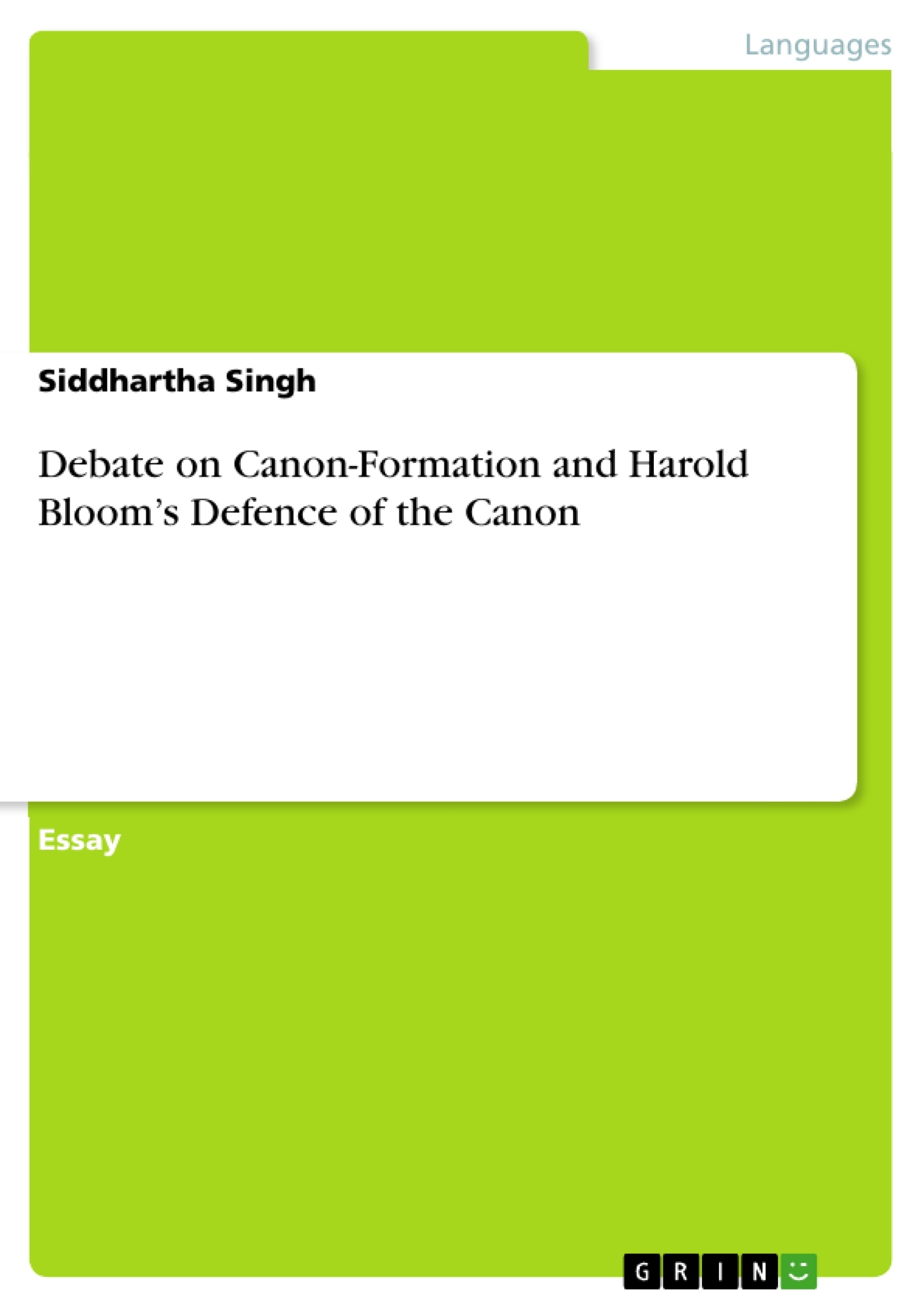The present paper shall seek to explore in brief a historical evolution and criteria of the canon-formation. It will further analyse the contemporary debate on canon-formation and Harold Bloom's defence of the canon.
The contemporary academic world is intensely involved in the debate on the process of canon-formation (I am limiting my focus on the western literary canon). Sometimes, some of these theorists demand to open the canon since they see some politics behind the canon. Such an offence on the canon, sometime it may be right, aims to reduce the canonical stature of an author of genius to the level of either an historian or a propagandist. The present paper shall seek to explore in brief a historical evolution and criteria of the canon-formation. It will further analyse the contemporary debate on canon-formation and Harold Bloom's defence of the canon.
Inhaltsverzeichnis (Table of Contents)
- Abstract
- Key terms
- Plato, Aristotle, Longinus and Theology
- The Rise of English Canon
- Eighteenth Century: The Origin of the Canon
- Nineteenth Century: Romantic Criticism and the Canon
- Twentieth Century: Modernism and the Canon
- Bloom's Redefining of the Canon
- Bloom's Defence of Canon Formation
- Bloom and Foucault
- Canon-formation and Repression
Zielsetzung und Themenschwerpunkte (Objectives and Key Themes)
This paper examines the history of canon-formation in Western literature, with a specific focus on Harold Bloom's defense of the canon and his approach to the concept of originality. The author explores how the canon has been constructed throughout history, analyzing various critical perspectives and highlighting key figures in the debate.
- Historical Evolution and Criteria of Canon-Formation
- Contemporary Debate on Canon-Formation
- Harold Bloom's Defense of the Canon
- Bloom's Concept of Originality and Strangeness
- The Relationship between Power and Knowledge in Canon-Formation
Zusammenfassung der Kapitel (Chapter Summaries)
- The paper begins by tracing the historical development of the literary canon, starting with Plato's rejection of poetry in his ideal state and ending with the rise of English studies in the twentieth century. It examines how various figures, from Aristotle to Longinus to T.S. Eliot, contributed to the evolution of canon-formation, highlighting the changing criteria for inclusion and the influence of different critical perspectives.
- The paper then turns to Harold Bloom's controversial defense of the canon, analyzing his key arguments in The Anxiety of Influence and The Western Canon. Bloom's concept of "anxiety of influence" and his emphasis on originality and strangeness are explored in detail.
- The author contrasts Bloom's views with those of Michel Foucault, who argues that power structures are embedded in knowledge systems and that the canon is a product of power dynamics. The paper explores the different perspectives on the relationship between power and knowledge in shaping the literary canon, including the potential for repression and exclusion.
Schlüsselwörter (Keywords)
The primary keywords and focus topics include: canon, canon-formation, literary history, anxiety of influence, originality, strangeness, aesthetic-strength, power, knowledge, repression, Western literary canon, Harold Bloom, Michel Foucault, T.S. Eliot, Matthew Arnold, Romantic criticism, Modernism, English studies.
Frequently Asked Questions
What is Harold Bloom's view on canon-formation?
Harold Bloom defends the Western literary canon based on aesthetic strength, originality, and "strangeness," rather than political or social criteria.
What does Bloom mean by "Anxiety of Influence"?
It refers to the psychological struggle of aspiring authors against the overwhelming influence of their great predecessors, which drives them to create original work.
How does Bloom's perspective differ from Michel Foucault's?
While Bloom focuses on individual genius and aesthetics, Foucault views the canon as a product of power dynamics and knowledge systems that can lead to repression.
What were the historical criteria for canon-formation?
Historically, criteria shifted from theological importance and moral instruction to romantic concepts of genius and modernistic aesthetic standards.
Why is the contemporary debate on the canon so intense?
The debate centers on whether the canon should be "opened" to include marginalized voices or remain focused on traditional standards of literary excellence.
- Quote paper
- Dr. Siddhartha Singh (Author), 2016, Debate on Canon-Formation and Harold Bloom’s Defence of the Canon, Munich, GRIN Verlag, https://www.grin.com/document/338539



